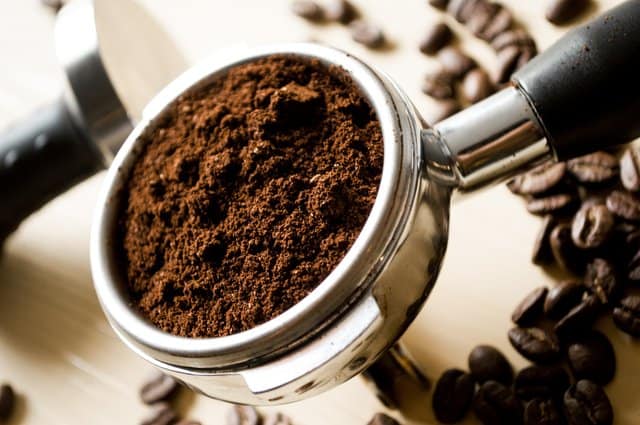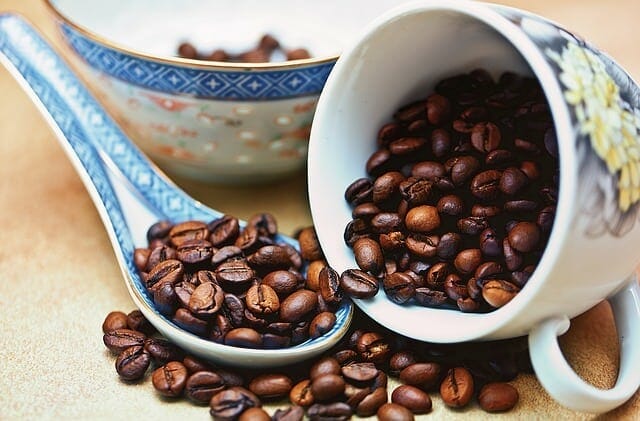Caffeine, the most popular stimulant in the world, is also a valuable weight loss aid for many people. It has properties thanks to which it mobilizes the body to higher activity and faster calorie burning. Interestingly, it can also increase the use of fat reserves as an energy source. It’s impossible to deny caffeine its positive bioactive effects, but it’s also impossible not to mention its drawbacks. After all, it’s a substance which affects the central nervous system, speeds up heart rate and can dangerously increase blood pressure. Too much caffeine is risky for our health, so we should use it in moderation, both when it comes to the amount of coffee and energy drinks we drink daily, as well as taking dietary supplements with caffeine.
Table of contents
Caffeine – occurrence, use. Natural caffeine and synthetic caffeine
Caffeine is a purine alkaloid that exhibits psychoactive abilities and activates the nervous system. Although it is mainly associated with coffee beans, it is also found in other plant materials, for example black and green tea, chocolate, cocoa, guarana, cola nuts.
In addition to natural caffeine, there is also a synthetic variety. Pure synthetic caffeine enters the bloodstream quickly, and therefore has a stronger, faster and more violent effect than natural caffeine. Although it gives more intense stimulation, it can also result in more intense side effects such as body tremors, sleep problems, excessive nervousness, and heart palpitations. Synthetic caffeine can also be followed by the unpleasant effect of a so-called energy “slide”.
As a way to stimulate the body and mind, we usually choose caffeine in the form of coffee, but energy drinks and effervescent tablets, which apart from caffeine contain a number of vitamins and minerals that revitalize and support brain function, are also quite popular. Pre-workout powder supplements and capsules with caffeine and other stimulating and performance-enhancing ingredients are popular among people who train.
When it comes to using caffeine for weight loss, the most popular are multi-ingredient fat burners that also contain other components that boost energy, block appetite and speed up the breakdown of lipid tissue. In all dietary supplements, whether pre-workout, improving brain function, supporting weight loss or other, the most popular is the so-called anhydrous caffeine, i.e. a dehydrated form of caffeine.
Coffee is the most valued source of caffeine

One cup of coffee contains around 60-80 mg of caffeine. There may be a little more or a little less, depending on the type of coffee and how it is brewed and served.
For many people, coffee is an indispensable part of their morning rituals. It helps us wake up, refresh our mind and body, andenter the dynamic rhythm of the day. Why, out of so many plant substances with similar effects, is coffee the most popular way to revive the body and fight fatigue? Simple, it is a perfect fusion of an excellent, deep, stimulating taste and aroma with good energising properties, for which, of course, caffeine is responsible.
Caffeine – action
How does caffeine affect the body? It stimulates the central nervous system, blocks the so-called adenosine receptors and leads to increased secretion of biogenic amines (catecholamines), which play the role of neurotransmitters, such as adrenaline, noradrenaline, acetylcholine, serotonin or dopamine. These processes result in accelerated heart rate, stimulation of the body, increased metabolic rate and activation of brain activity.
Caffeine acts quickly and rapidly, almost immediately after intake it gives effects such as increased energy levels, revival, elimination of fatigue, improvement of thought processes, improved ability to focus, as well as increased pulse rate and metabolism.
The quickly noticeable, pronounced effect of caffeine is a result of its fast absorption from the digestive tract into the bloodstream. Its maximum concentration in the bloodstream is reached after about 30-45 minutes after consumption. Then its level gradually decreases. After several hours, it is excreted from the body with urine (earlier it is metabolized in the liver to theobromine, theophylline and paraxanthine).
Effects of caffeine on the body
Once in the body, caffeine affects almost all systems, from the nervous system to the digestive system. Let’s see what effects it has on different parts of our body:
Effects of caffeine on the nervous system and brain function
Caffeine stimulates the autonomic (vegetative) nervous system, activating the vasomotor center. It stimulates the cerebral cortex and subcortical centers. It also influences neurotransmitters responsible for sending impulses between neurons, such as dopamine, adrenaline, acetylcholine, noradrenaline and serotonin. By stimulating their release, it contributes to putting the body in a state of mobilisation and readiness for action.
Other perceptible effects of caffeine are: increased energy level and motivation, improvement of mood, reduction of tiredness and sleepiness. What’s more, caffeine can alleviate depressive states, reduce feelings of discouragement and anxiety.
Caffeine also temporarily improves functioning of the intellect, speeds up thinking processes, increases efficiency of mental work, increases tolerance for psychophysical effort. It additionally influences the process of remembering new information, increases alertness, makes it easier to focus and maintain high concentration on a given task for a long time, positively influences mood and level of creativity.
Effects of caffeine on the circulatory system
Caffeine has a significant effect on the work of the card iovascular system, and contrary to some opinions, this effect is not negative, but on the contrary – positive, unless of course we exaggerate its amount, and unless we suffer from diseases in which its use is not recommended.
Caffeine consumed in excessive doses can cause a series of negative effects, including heart palpitations and increased blood pressure. If smoking, lack of exercise and a generally unhealthy lifestyle are added to this, the risk of adverse health effects increases. However, caffeine consumed in moderate doses can have a protective effect on the heart, improve circulation, and improve the condition of blood vessels.
Along with stimulation of the nervous system and increased secretion of norepinephrine and adrenaline by caffeine, there is an acceleration of the heart rate and an increase in the force of myocardial contraction (with smaller doses, this effect is insignificant, while the larger portions of caffeine, the more pronounced it is) and a slight increase in blood pressure.
Caffeine has the effect of dilating blood vessels, which in turn leads to easier, freer blood flow. Because of this property, caffeine is often helpful for people struggling with moderate circulatory problems.
Effects of caffeine on the respiratory system
Caffeine also has quite an effect on the respiratory system. It stimulates the respiratory centre, dilates and relaxes the bronchi, makes it easier and deeper to breathe. It increases the flow of air through the respiratory tract, thus improving the oxygenation of cells throughout the body. Thanks to these properties, caffeine can be helpful in relieving asthma symptoms and shortness of breath. Because of these properties, caffeine is often included in medications that dilate the airways.
Effects of caffeine on the skeletal and muscular system
Consumption of large amounts of caffeine can have a negative effect on the condition of bones. Caffeine stimulates urine excretion, which removes calcium from the body. Caffeine may also slow down the bone tissue regeneration process, decrease bone density and disrupt its structure. As a result it can increase the risk of osteoporosis (as well as periodontal diseases).
It’s worth mentioning, however, that caffeine consumed in moderation doesn’t threaten our bones. It’s only when we consume large amounts over a long period of time that we could have cause for concern.
Caffeine has a positive effect on muscles. By increasing blood flow, it leads to better supplying muscles with oxygen and nutrients. It also improves the transport of glucose to muscles and facilitates calcium release in muscle cells. As a result, it contributes to improved muscle performance, better muscle coordination, and increased strength and endurance.
Caffeine also protects muscle proteins, prevents catabolism, and helps build muscle mass. Thanks to its positive effect on muscles and energising properties, caffeine is a must-have for most people who train and strive to achieve the perfect body shape.
How else does caffeine affect our body?
- It has analgesic properties, and intensifies and accelerates the effects of analgesics and antipyretics.
- It stimulates digestive processes, improves intestinal motility, increases secretion of gastric juice, improves the function of the liver and pancreas.
- It increases blood flow through kidneys and has diuretic properties.
- It helps in lowered libido and erection problems, especially when they are caused by fatigue.
- It increases physical and mental efficiency.
- Used externally (e.g. as an ingredient in ready-made cosmetics or homemade body scrub or mask) stimulates skin microcirculation, reduces cellulite, reduces swelling, improves oxygenation and nutrition of skin cells, improves skin tone and firmness. It promotes a nice, healthy look of the skin.
Caffeine for slimming

The effect of caffeine on weight loss is another issue that is worth taking a closer look at. There is a reason why most people who are trying to lose excess weight consider caffeine to be one of their most important allies. It’s true that caffeine alone, without the support of a properly tailored diet, physical activity or other substances supporting weight loss, will not make us slim, but with its help we are able to lose weight faster and more efficiently.
How does caffeine support weight loss?
- It speeds up metabolism. Caffeine slightly increases thermogenesis and raises the metabolic rate for some time after taking it. This means that immediately after drinking coffee or consuming another drink or dietary supplement with caffeine the rate of calorie burning in our body increases. It’s a good idea to take advantage of this property of caffeine, reaching for it just before your workout. This will significantly increase the rate of burning calories.
- It stimulates lipolysis (fat tissue breakdown). A very interesting and important property of caffeine is mobilisation of stored fat. By stimulating the nervous system and activating adrenaline secretion, caffeine leads to increased release of fatty acids into the blood, which are then used as a source of energy for the body. What’s more, caffeine contributes to the reduction of fat cells.
- Energy boost. After a dose of caffeine we feel full of vitality and energy, we are more motivated to act and we are more optimistic and enthusiastic. Caffeine can help us mobilize to physical activity, which is known to be very important during weight loss. For these reasons caffeine is often a valuable support for people who don’t always want to train, who find it hard to motivate themselves and who are sometimes discouraged and in a bad mood.
- It reduces fatigue, increases resistance to exercise, and improves physical efficiency. It will undoubtedly be appreciated by people who sometimes (or often) find it difficult to complete a workout due to lack of sleep, fatigue, exhaustion, or poor physical condition. Caffeine invigorates the body and mind, combats fatigue and increases physical strength and endurance. Thanks to that it allows us to exercise longer and more effectively without the annoying effect of reluctance and lack of power appearing during workout. As a result we lose weight faster. What’s more, caffeine improves concentration, making it easier to perform a workout without getting distracted.
- It suppresses the appetite, helps control hunger and increases the feeling of satiety. Although this effect is not long-lasting, caffeine allows us to limit calorie intake to some extent.
How to use caffeine for weight loss?
We have a choice:
- multi-ingredient fat burners equipped with caffeine,
- single-ingredient caffeine pills,
- drinking energy drinks,
- drinking coffee or other infusions from plants that contain caffeine.
There is no doubt that among the mentioned methods, fat burners with caffeine are the most effective way to lose weight efficiently. They are focused strictly on weight reduction and are composed in such a way as to intensify and accelerate the process of breaking down accumulated fat tissue. When it comes to the overall mobilization of the body to get rid of fat reserves, they work in many directions more efficiently than coffee, regular caffeine in pills or energy drinks.
Strong, effective, multicomponent fat reducers with caffeine worth paying attention to:
- Cappucino MCT
- Nutrigo Lab Burner
- Keto Actives
What instead of coffee? What instead of caffeine?

Caffeine from coffee, synthetic caffeine – these are the most popular, but in fact one of many stimulants we can use, whether as a daily drink in place of coffee, as a way to speed up weight loss, to improve mental performance, or as a way to increase fitness and physical strength.
Alternative stimulants should also be of interest to people who can’t tolerate coffee and who experience bad moods after coffee or regular caffeine, which, as it turns out, is not a rare phenomenon these days.
Coffee substitutes containing caffeine (or its variants)
Green tea
Green tea contains so-called theine, which is chemically very similar to caffeine, but does not have the same effect as caffeine from coffee. It gives a milder, but longer-lasting effect of stimulation and revival, and also positively influences our mood and gives us many health benefits, including stimulation of toxin removal, improved digestion and metabolism.
Yerba mate (holly)
Yerba mate is available in the form of fine dried leaves and twigs used for infusions. Yerba contains caffeine in the form of so-called matein. It effectively stimulates the body and mind, but unlike coffee, it does not have an abrupt and short-lasting effect. The stimulating yerba mate substances are released slowly and the effect of stimulation is milder but spread over a long period of time.
Another advantage of yerba is its high content of valuable antioxidants and vitamins as well as the lower level of mineral leaching from the body compared to coffee. Its disadvantage for a large number of people is its taste – bitter, grassy, incomparable to the delicious taste of coffee.
Guarana
Guarana is most often found in extract form in ready-made diet supplements or in ground form. Powdered Paulinia guarana fruit is very versatile in use. It can be brewed, added to cocktails, tea and other drinks or added to food.
Guarana contains a specific type of caffeine called guaranine, which is known for its excellent energizing properties, as well as other beneficial effects, such as improving mental performance, concentration and memory, reducing stress, stabilizing mood, increasing thermogenesis and speeding up metabolism, eliminating libido disorders, improving immunity, and having beneficial effects on the cardiovascular system. An important advantage of guarana is its long-lasting effect and the lack of negative side effects which sometimes occur after caffeine from coffee.
Cocoa
It contains caffeine, as well as another stimulating substance – theobromine. Cocoa is mainly associated with cacao, a popular brown powder that we often add to milk and desserts. However, cocoa beans can also be purchased whole or in a slightly ground form.
In any form, cocoa beans give us a dose of energy, have an effect of physical and mental revival, improve our mood, reduce fatigue and have a positive influence on brain function. However, there is no doubt that the raw, low-processed beans have the strongest effect. We can add cocoa beans to cocktails, snacks, desserts, hot and cold drinks, or eat them as a small snack.
Other coffee substitutes with stimulating properties but without caffeine
- Ginseng,
- taurine,
- L-tyrosine,
- Ginkgo biloba,
- maca root,
- synephrine.
Caffeine – side effects

Caffeine is a relatively safe substance and rather harmless to our health and life. Only with large doses consumed in a short time it becomes risky. A safe dose of caffeine is considered to be 300 mg per day. A dose of more than 500 mg per day is considered an overdose.
A lethal dose of caffeine is about 150 mg per 1 kg of body weight (or about 10-13 g), which means we’d have to drink about 60-80 cups of coffee in a short time. This is unrealistic, although of course theoretically possible. However, caffeine poisoning can occur at lower doses, such as 1500 or 2000 mg.
The most common side effects associated with too high a caffeine intake are:
- over-stimulation,
- racing thoughts,
- inability to focus attention, distraction,
- heart palpitations,
- headaches and dizziness,
- hand tremors,
- seizures,
- cold sweats,
- shortness of breath,
- blood pressure spikes,
- nervousness, irritability, aggressiveness,
- restlessness, anxiety,
- sleep disturbances,
- nausea, vomiting,
- stomach pains.
What is worth noting is that each of us has our own tolerance for caffeine. For one person two cups a day is too much, for another 3 cups is standard. Some people experience heart palpitations and cold sweats after drinking an energy drink, while others feel only a slight stimulation.
We must therefore observe ourselves how we react to caffeine and whether it is well tolerated by us or not. However, if we experience negative side effects from caffeine, it’s better to give it up and try similar, but milder substances.
They add energy, absorb fat tissue and block appetite.
Check out the Fat Burners Ranking!

Sources:

